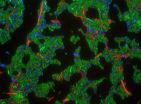Study finds fair trade logo boosts consumer's willingness to pay
Researchers at the University of Bonn investigate how our brain responds to the ethical logo
2015-08-27
(Press-News.org) Products labeled with a Fair Trade logo cause prospective buyers to dig deeper into their pockets. In an experiment conducted at the University of Bonn, participants were willing to pay on average 30 percent more for ethically produced goods, compared to their conventionally produced counterparts. The neuroscientists analyzed the neural pathways involved in processing products with a Fair Trade emblem. They identified a potential mechanism that explains why Fair Trade products are evaluated more positively. For instance, activity in the brain's reward center increases and thereby alters willingness to pay computations. The study results have now been published in the journal Frontiers in Behavioral Neuroscience.
A blue-green circle around a stylized figure in black with a raised arm: Since its launch in 2003, the Fair Trade logo has hardly changed. Currently, it is found on a great variety of products, including coffee, bananas, creams, wine bottles and even soccer balls. Critically, the emblem influences subjective evaluations of products, as researchers at the Center for Economics and Neuroscience at the University of Bonn demonstrated in their latest study: While test subjects lay in a brain scanner, they bid on various food products. Each of these products was available in two versions - Fair Trade or conventionally produced. The results were clear: On average, participants were willing to pay around 30 percent more for products produced according to Fair Trade standards, compared to their conventionally produced counterparts.
Logo activates brain's reward system
As the study was conducted in a brain scanner at the LIFE&BRAIN Center in Bonn, researchers could also show that products labeled with this emblem led to increased activity in specific brain regions: For example, they observed increased activation in regions important for reward processing as well as frontal regions that process abstract product attributes (e.g. whether or not a product carries a Fair Trade logo, and the meaning of such a label).
Part of the frontal lobe ultimately calculates the willingness to pay in an area known as the ventromedial prefrontal cortex, (vmPFC), which refers to the area's location. "The higher the activity in the vmPFC, the more money subjects were willing to pay," explains Prof. Dr. Bernd Weber, neuroscientist at the University of Bonn. The scanner data suggests that the vmPFC integrates information from other brain areas and uses this information to calculate an overall value. Based on information from various regions, it reaches a decision: Would I pay 50 cents for the Fair Frade banana? Or just 30 cents?
Fair Trade products taste better
The Fair Trade logo leads to even more widespread effects: the food labeled with Fair Trade logos also tasted better. In a second experiment, participants sampled two pieces of chocolate, declared as coming from either Fair Trade or conventional production. Participants then rated the product's palatability. The piece of chocolate labeled with a Fair Trade emblem received superior taste evaluations.
"Pure imagination," says the study's lead author Laura Enax. "Both pieces of chocolate are actually identical."
INFORMATION:
Publication: Laura Enax, Vanessa Krapp, Alexandra Piehl, Bernd Weber: Effects of social sustainability signals on neural valuation signals and taste-experience of food products; Frontiers in Behavioral Neuroscience; DOI: 10.3389/fnbeh.2015.00247
Contact for media inquiries:
Professor Dr. Bernd Weber
Center for Economics and Neuroscience
The University of Bonn & Life&Brain
Tel. ++49-(0)228-6885-262
E-mail: bernd.weber@ukb.uni-bonn.de
Laura Enax
Center for Economics and Neuroscience
The University of Bonn
Tel. ++49-(0)228-6885-142
E-mail: laura.enax@uni-bonn.de
[Attachments] See images for this press release:

ELSE PRESS RELEASES FROM THIS DATE:
2015-08-27
This news release is available in German. The yields of many important crops in Europe have been stagnating since the 1990s. As a result, the input of organic matter into the soil - the crucial source for humus formation - is decreasing. Scientists from the Technical University Munich (TUM) suspect that the humus stocks of arable soils are declining due to the influence of climate change. Humus, however, is a key factor for soil functionality, which is why this development poses a threat to agricultural production - and, moreover, in a worldwide context.
In their ...
2015-08-27
Young adults diagnosed with attention deficit/hyperactivity disorder (ADHD) in adolescence show differences in brain structure and perform poorly in memory tests compared to their peers, according to new research from the University of Cambridge, UK, and the University of Oulu, Finland.
The findings, published today in the journal European Child Adolescent Psychiatry, suggest that aspects of ADHD may persist into adulthood, even when current diagnostic criteria fail to identify the disorder.
ADHD is a disorder characterised by short attention span, restlessness and ...
2015-08-27
This news release is available in French and Portuguese. Health providers trained to perform malaria rapid diagnostic tests (RDT) are still prescribing valuable malaria medicines to patients who do not have malaria, according to new research published in PLOS ONE.
Almost 5,000 participants from 40 communities took part in the study, at a variety of public health facilities, pharmacies and drug stores in the Nigerian state of Enugu. Despite the three different training interventions that they received and their satisfaction with the courses and materials, rates of ...
2015-08-27
A study conducted with experienced scholars of Zen-Meditation shows that mental focussing can induce learning mechanisms, similar to physical training. Researchers at the Ruhr-University Bochum and the Ludwig-Maximilians-University München discovered this phenomenon during a scientifically monitored meditation retreat. The journal Scientific Reports, from the makers of Nature, has now published their new findings on the plasticity of the brain.
Participants of the study use a special meditation technique
The participants were all Zen-scholars with many years of ...
2015-08-27
Researchers led by the UCLA Fielding School of Public Health examined HIV testing trends among adults ages 50 through 64 both before and after 2006, when the Centers for Disease Control and Prevention (CDC) recommended that most doctors automatically screen all patients for HIV regardless of whether they have symptoms.
The researchers found that gains in HIV testing were not sustained over time. Levels of engagement in HIV risk behaviors remained constant, yet testing decreased among this age group from 5.5 percent in 2003 to 3.6 percent in 2006. It increased immediately ...
2015-08-27
It's bacteria against bacteria, and one of them is going down.
Two UC Santa Barbara graduate students have demonstrated how certain microbes exploit proteins in nearby bacteria to deliver toxins and kill them. The mechanisms behind this bacterial warfare, the researchers suggest, could be harnessed to target pathogenic bacteria. Their findings appear in the Proceedings of the National Academy of Sciences.
Lead authors Julia L.E. Willett and Grant C. Gucinski have detailed how gram-negative bacteria use contact-dependent growth inhibition (CDI) systems to infiltrate ...
2015-08-27
Some children react more strongly to negative experiences than others. Researchers from the Norwegian University of Science and Technology (NTNU) have found a link between aggression and variants of a particular gene.
But children who react most aggressively also tend to respond more strongly to good experiences, the Norwegian researchers found. These children's mood swings have deeper valleys, but also greater peaks.
Aggression is common in young children. Aggressive behaviour increases until children are around 4 years old, and then gradually subsides.
Research ...
2015-08-27
PROVIDENCE, R.I. [Brown University] -- A study provides multiple lines of new evidence that pigments and the microbodies that produce them can remain evident in a dinosaur fossil. In the journal Scientific Reports, an international team of paleontologists correlates the distinct chemical signature of animal pigment with physical evidence of melanosome organelles in the fossilized feathers of Anchiornis huxleyi, a bird-like dinosaur that died about 150 million years ago in China.
The idea that melanosomes, which produce melanin pigment, are preserved in fossils has been ...
2015-08-27
Physicists have found a radical new way confine electromagnetic energy without it leaking away, akin to throwing a pebble into a pond with no splash.
The theory could have broad ranging applications from explaining dark matter to combating energy losses in future technologies.
However, it appears to contradict a fundamental tenet of electrodynamics, that accelerated charges create electromagnetic radiation, said lead researcher Dr Andrey Miroshnichenko from The Australian National University (ANU).
"This problem has puzzled many people. It took us a year to get this ...
2015-08-27
COLUMBUS, Ohio - Many clinical trials use genome sequencing to learn which gene mutations are present in a patient's tumor cells. The question is important because targeting the right mutations with the right drugs can stop cancer in its tracks. But it can be difficult to determine whether there is evidence in the medical literature that particular mutations might drive cancer growth and could be targeted by therapy, and which mutations are of no consequence.
To help molecular pathologists, laboratory directors, bioinformaticians and oncologists identify key mutations ...
LAST 30 PRESS RELEASES:
[Press-News.org] Study finds fair trade logo boosts consumer's willingness to pay
Researchers at the University of Bonn investigate how our brain responds to the ethical logo



